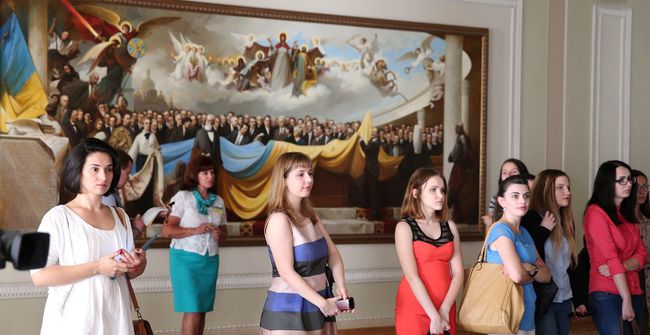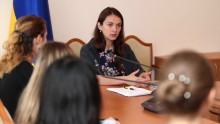Den’s pupil, as Hanna Hopko likes to call herself, took the stand as the Summer School of Journalism (SSJ)’s lecturer. However, it was not a traditional in-school meeting, but rather a field session. When invited by this newspaper to our office, Hopko made a counterproposal, inviting the students to come to the Verkhovna Rada. Before their meeting with the MP started, the SSJ students had a tour of the parliament building, though. Most of them had only seen the Rada on TV, but now they were able to take a look inside.
Students were questioning what they saw as soon as they entered the building’s entrance hall. After all, wall panel The Flourishing Socialist Ukraine, featuring the hammer and sickle, red flags, and five-pointed stars, was just too much of an eyesore: “Why this painting, containing elements of the Soviet Communist ideology, has not been altered to express some other, pro-Ukrainian spirit?” Is the de-Communization law lacking force in the very location where MPs voted for it? The young journalists did not receive any answer to this enquiry. It was a case of intergenerational conflict of opinions.
On the other hand, they took a liking to Oleksii Kulakov’s painting Nation-Building. The picture depicts a historic day, August 24, 1991. Then, 350 MPs out of 362 present voted for Ukraine’s independence. In addition to heroes of modern history, the painting depicts leading figures of the Ukrainian people’s more distant past – Bohdan Khmelnytsky, Ivan Mazepa, Mykhailo Hrushevsky, the majestic princes of Kyivan Rus’ – and cultural figures, including Lesia Ukrainka, Taras Shevchenko, Ivan Franko, and Nikolai Gogol.
The meeting with Hopko came next. The MP greeted the guests at the premises of the Verkhovna Rada Committee for Foreign Affairs, which she chairs. Despite having a busy schedule, Hopko allocated time for what she described as “a talk with Ukraine’s future.”

“IT WAS UNEXPECTED AND PLEASANT FOR ME TO VISIT THE VERKHOVNA RADA,” NATALIA BEZVOZIUK (ODESA NATIONAL ILLIA MECHNIKOV UNIVERSITY) SAYS AFTER THE EXCURSION TO PARLIAMENT. “AFTER ALL, IT IS A BUILDING IN WHICH HISTORIC DECISIONS ARE MADE FOR UKRAINE. AND I HOPE IT WILL BE ASSOCIATED IN THE FUTURE NOT WITH THE SOCIALIST PAST AND AN UNPROFESSIONAL PARLIAMENT BUT WITH THE KEY MOMENTS IN THE HISTORY OF LATTER-DAY UKRAINE, WHICH WILL PLACE IT AMONG THE DEVELOPED COUNTRIES”
“I had long wanted to meet Hopko, a young MP well-versed in international politics,” Kateryna Sadlovska told us. She studies at Ivan Franko Lviv National University. “I heard about her from my teachers at the university even before coming to Kyiv. Actually, Hopko graduated from Lviv National University, majoring in journalism. During the meeting, she recalled her alma mater and stated that the young people should build civil society. She sees the feeling of responsibility for those elected to the Rada as a required feature of such society. It needs to be active, able to read laws rather than just rely on the opinions of other politicians. Hopko also emphasized the importance of educating national elites which would strive for nation-building, not just career and personal enrichment. The rest of the world wants to see Ukrainians acting like this.”
The meeting with lecturer Hopko covered many areas, ranging from the issue of international sanctions against Russia over its military aggression in Ukraine to the MP’s much-discussed vote in favor of the draft amendments to the Constitution.

“WE MUST DRIVE THE RUSSIAN ECONOMY INTO THE STATE OF ABSOLUTE HOPELESSNESS”
Kateryna SADLOVSKA:
“Den has criticized the Minsk format of negotiations from the outset, as it amounts to a diplomatic encirclement of Ukraine. What may our future action plan look like?”
Hanna Hopko: “The Minsk Accords are an attempt at a diplomatic solution as proposed by the international community that clearly understands the situation in Ukraine. For all the criticism of it, we should understand that nobody has proposed an alternative, a plan B. Still, we support the peace process, demonstrating our strategic partners that Ukraine is a reliable ally. We fulfill our commitments and get additional trump cards allowing us to strengthen pressure on Russia. However, the tools of foreign policy are not limited to those mentioned. The sanctions are imposed only after diplomatic efforts failed to bring desired results. We very much look forward to strengthening them, and one of the options is cutting Russia off the SWIFT payment system in case of it breaking the accords.
“We are not naive and realize that many EU economies are suffering a lot from the crisis and war in Ukraine. Therefore, we need a clear understanding of the approach needed to preserve the EU’s unity. We should stay a priority in the foreign policy of the EU as well as the US. We must understand that in the world of global challenges, Ukraine is not the top priority. If we look at recent weeks, searching for solutions to Greece’s financial situation was a higher priority for Angela Merkel and many other world leaders. Thus, it is very important for us to become more proactive in influencing the West into becoming more demanding towards Russia.
“From Ukraine, it seems that everyone needs us. However, the reality is that our partners may simply leave us to our own devices, saying: ‘If you do not want to stay in the Minsk process, then mobilize all your men and fight Russia directly.’ The Minsk talks can be seen as a method of deterrence while we have no weapons. Our rulers harmed and plundered the nation for 25 years. No one was ready for a military aggression. Therefore, we still need time to prepare for a potential escalation of the conflict, which may well involve the enemy expanding its invasion. We also need to purge the army and the law-enforcement services of agents working against Ukraine. We should also fight corruption, upgrade our weapons, and build the army up.
“We must use this time to persuade the international partners that there is civil society here, there are right people – in the parliament as well as in the Cabinet and in the Presidential Administration. There are not too many of them so far, but they do signal their willingness to change the country instead of simply continuing the old tradition of stealing public money. This new generation will grow more important, and sooner or later, become drivers of change, nation-builders. Thus, we will not allow the West to abandon us to Russia’s mercies, because at this stage, the costs of a rupture may be just too high. It can easily lead to a real escalation, involving provocations similar to the Mukacheve incident or the terrorist attacks in Lviv. In this case, destabilization will start all over Ukraine, directed by a network of the Russian secret services’ agents. Can you imagine the ensuing chaos?
“Therefore, it is necessary to rely on the sanctions. I would advise you to recall the example of Iran. When sanctions were first imposed on them, they said that nothing would scare them, and they would endure anything. However, after the economic isolation set in, they gradually came to realize the true power of this trap. Iran then improved relations with the US and the EU, because they wanted to see the sanctions lifted. Thus, we need to bid our time. We must drive the Russian economy into the state of absolute hopelessness, making oligarchs who surround Vladimir Putin and the rest of Russians understand that the aggression against Ukraine was their biggest mistake. The Russian empire will collapse, undermined by endurance and wise policies of Kyivan Rus’.
“However, it cannot happen by itself. It seemed that the USSR fell apart very quickly, but it did not. Decades of horrific repression and recurrent manmade famines preceded its collapse. We have to understand clearly that Ukraine is now gaining real experience in conflict resolution. Despite all the skepticism and a considerable number of underhand moves around all of this, I have still a lot of optimism left. We need to be wise rather than scream ‘They are selling us out!’ We have to understand how to negotiate and to set our conditions for our geopolitical partners who can put real pressure on Russia. We must ensure that falling oil prices and sanctions are gradually lowering Russia’s potential to intimidate partners and escalate the conflict in Ukraine.”
“THE ‘MINSK FORMAT’ HAS BEEN EXPANDED DE FACTO LONG AGO”
Ihor SAMOKYSH:
“Many experts say that Ukraine needs to change the format of the talks by getting the US involved in them. Could this be the solution, given that the ‘Minsk format’ has already proven to be ineffective?”
H.H.: “This is already happening. John Kerry’s meetings and Victoria Nuland’s visits indicate that the ‘Minsk format’ has been expanded de facto long ago. Perhaps there has been no official announcement, but you can see it by looking who is helping Ukraine, who has not abandoned it in its fight against the aggressor. At a meeting of our committee, we discussed the control mechanisms for international assistance distribution. Back in May, we started working on mechanisms of transparency that would allow us to have every euro or dollar, every railcar registered and reports of their use published on free-access websites. The way we use this assistance determines how much trust the world has in us.
“A lot of countries have long been involved with resolving the situation in eastern Ukraine. For example, the information campaign has had lots of various partners working on it. Almost 380 individual international assistance projects, totaling 3.8 billion dollars, are being implemented in Ukraine. This assistance comes in great many forms, including, for example, body armor for our soldiers, which was provided by the governments of Canada, Australia, and Japan through a UN program. Arms talks are ongoing, and a delegation of Ukrainian MPs discussed that issue with officials in the US and Canada in late July.
“Over July, we had several meetings with delegations and chairpersons of parliamentary committees for foreign affairs and security of Estonia, Lithuania, Poland, and Hungary, which we used to try and convince them how important stability in Ukraine was for them. By providing humanitarian assistance, they invest in themselves. This is beneficial cooperation, because we are equal partners in this field.
“One can plunge into rhetoric, talking about World War Two, Adolf Hitler annexation of part of the Czechoslovak Republic and its consequences. One can also recall the Budapest Memorandum, as well as the 2008 decision to deny the NATO Membership Action Plan to Georgia and Ukraine. While analyzing all this, we must understand that there are certain hard facts, and determine our tactical steps and overall strategy. It is necessary to calculate and compare the numbers of Ukrainian and Russian soldiers, our weaponry stocks, assistance flows, and then determine what our chances are. Only after it is done, one may decide what is more important for us at this stage. As for the populists who shout that they would have long undone the Minsk Accords and proposed another format, I want to tell them: I am not sure whether they would then have any meetings with Merkel and other world leaders.”







